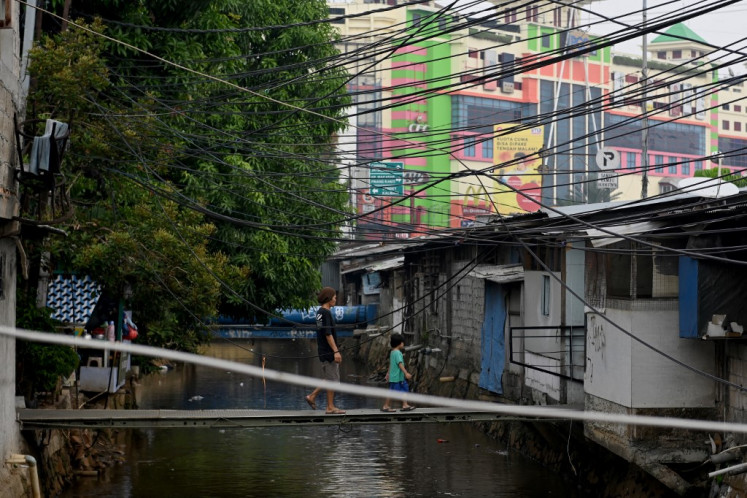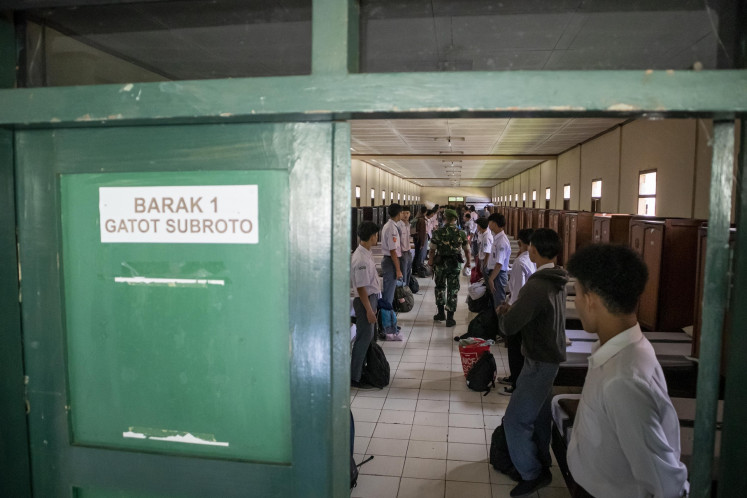Public awareness of AEC remains low
United: ASEAN member states are pictured on an ASEAN Economic Community (AEC) map
Change text size
Gift Premium Articles
to Anyone
 United: ASEAN member states are pictured on an ASEAN Economic Community (AEC) map. The AEC aims to develop a single market and develop production bases for goods. (Tribunnews.com) (AEC) map. The AEC aims to develop a single market and develop production bases for goods. (Tribunnews.com)
United: ASEAN member states are pictured on an ASEAN Economic Community (AEC) map. The AEC aims to develop a single market and develop production bases for goods. (Tribunnews.com) (AEC) map. The AEC aims to develop a single market and develop production bases for goods. (Tribunnews.com)
U
span class="caption">United: ASEAN member states are pictured on an ASEAN Economic Community (AEC) map. The AEC aims to develop a single market and develop production bases for goods. (Tribunnews.com)
A
lack of public awareness about the ASEAN Economic Community (AEC) would
hamper the successful implementation of national policies that the
government has set in order to achieve the AEC goals, a survey has
shown.
A survey conducted by the Indonesian Institute of
Sciences (LIPI) ASEAN team has revealed that there is low awareness of
the AEC among Indonesian people, although there are only 30 days left
before the AEC takes effect on Jan. 1.
LIPI head Iskandar
Zulkarnain said the establishment of the AEC marked the transformation
of ASEAN from a state-policy oriented regional block to a
people-oriented community, which aimed to improve the welfare of people
in the region.
'The existence of the AEC can give both
opportunities and challenges to Indonesia, especially in terms of the
competitiveness and resilience of the country's economic sector,'
Zulkarnain said in Jakarta on Wednesday.
He added that the
Indonesian government had issued three Presidential Instructions
(Inpres) as anticipatory measures to improve national competitiveness.
However, he said, the implementation of the regulations and their
introduction to the public had not been optimal.
"The results of
the survey that LIPI conducted in May, which involved both consumers and
producers, indicated a disparity of awareness of the AEC among our
society. All this time, the introduction of AEC programs has been
directed only at stakeholders, especially in the business sector,"
Zulkarnain said.
Raising public awareness was one measure that
needed to be implemented if Indonesia wanted to improve its national and
regional competitiveness in ASEAN, he added.
LIPI senior
researcher Tri Nuke Pudjiastuti said that based on the survey, the level
of public understanding toward the AEC was only 25.90 percent, while
the awareness level among business players and traders stood at 27.80
percent.
Nuke further explained that as a free market and
production base, ASEAN was a huge market with a population of 650
million people. For consumer society, the AEC would certainly bring
advantages, including lower prices and better quality goods and
services.
"About 43.7 percent of respondents are certain that the AEC will bring economic benefits to consumers," she said.
Nuke
said the mobility of the workforce after the official implementation of
the AEC was predicted to provide structural changes. Local labor
markets needed to maintain competitiveness and be prepared for the
presence of an ASEAN labor market, she said.
"The consequences
of the AEC have not been realized and these have affected the level of
preparedness of our society. Around 82.6 percent of our respondents do
not know about the mobility of labor under the AEC,' she said.
The
researchers further said some indicators showed that the AEC would
threaten production activities in the domestic industry. A flood of
foreign products and weaker export capabilities of local entrepreneurs
were predicted to emerge in the near future.
"If some of these
issues are not managed properly, Indonesia will only become a consumer
base for other ASEAN countries," said Nuke. (ebf)(+)









